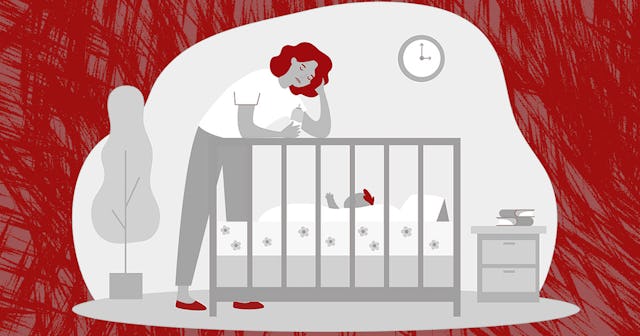Postpartum Anxiety Hit Me Hard––Even Though I Have A History Of Generalized Anxiety

I’ve dealt with anxiety for most of my life. My dad died when I was 13, which is a particularly inopportune time to lose a parent, and it was the beginning of what is now a two-decade struggle. I also lost my sister when she was 30 and I was 24, back in 2012. That meant literally half of my immediate family died before I turned 25, and it threw me into another tailspin with anxiety that I’m still working my way through.
I’ve been on low-dose medication in years past, but I went off of it last summer in anticipation of getting pregnant in the fall. I thought it would take a little while for me to conceive, particularly since I had a grapefruit-sized Fallopian tube cyst removed in October, but I got pregnant after one try at the end of November. Truthfully, I had hoped for a couple more months to fully get used to the idea and mentally prepare, but the ride was already moving.
Setting aside the anxiety that comes from only having appointments once a month that offer some reassurance your baby is still alive — at least until you can feel movement, but that brings a whole new set of worries — we really don’t talk enough about the anxiety that can hit postpartum.
I had a relatively uncomplicated delivery, even in month five of the pandemic. I was induced at 38 weeks because of high blood pressure, and within 13 hours of my induction I was holding a brand new baby girl in my arms.
The first 48 to 72 hours after delivery were a blur, as I’m sure they are for every new mom. I didn’t sleep more than two hours at a time, if that, and I worried constantly about the jaundice she was born with and when it would go away and if it was getting worse. We supplemented with formula at the hospital in an attempt to bring her bilirubin levels down before we left, and then a little more once we got her home. My milk came in a couple (long) days later, but my supply was low — so we kept going with supplementing, and I felt guilty for my inability to provide.
Ghislain & Marie David de Lossy/Getty
In part because she was a couple weeks early and her digestive system hadn’t quite caught up yet, many times while we were bottle feeding, she would choke. It didn’t matter what type of nipple we tried. Whenever we did a feeding with a bottle, a choking episode usually occurred. And it wasn’t just a sputtering kind of choking. She would sit there, eyes glassy, not breathing, for what felt like an eternity before she was able to clear it, while I thumped her back as hard as I dared with a newborn.
Every time it happened, I felt an overwhelming sense of dread that she was going to die and it would be all my fault. It was my fault we were having to use formula. It was my fault she was born early because I’m overweight and developed high blood pressure. My fault, my doing, my failures.
And the more I stared down this first hurdle of something going wrong, the more my brain whirled around every possible thing that could go wrong for the rest of my life being her mother. I imagined every physical ailment, every broken bone, every psychological condition or scenario that could take her from me. When I woke in the night to feed her, my very worst fear shouted from the label sewn into the side of her bassinet.
WARNING: INFANTS HAVE SUFFOCATED
When I reached for her bouncer, it shouted back.
WARNING: Infants have suffered SKULL FRACTURES
When I pulled out her car seat, it shouted back.
WARNING: Infants have STRANGLED
It was inescapable. And in my heightened hormonal, sleep-deprived state, it was agonizing. But I didn’t know how much was me and my old pal Regular Anxiety and how much was the hormones. I tried to explain to my patiently-trying-to-understand-husband that it wasn’t just the choking that was bothering me, it was the sheer immensity of the life I was now responsible for and the infinite combinations of terrible events that were now possible every single day. How could I possibly handle this level of panic for the rest of my life? Would every little thing that went wrong constantly send me into a spiral that ended with tears I couldn’t seem to stop? It seemed untenable. I wanted to escape the emotions somehow.
Thankfully, the worst of it subsided after about three and a half weeks. I went on a different low-dose medication that helped even more, but I know a large part of the hell that was those first few weeks was because of the hormones, and I was unprepared for the way it would affect me. I know there’s no way to truly prepare, because everyone responds differently, but I heard so much about postpartum depression and not enough about how I could experience postpartum anxiety. I never really experienced the markers of postpartum depression, but those were the emotions I was prepared to cope with after delivery. Had someone reassured me that it would be normal to feel a heightened level of panic and worry and it would likely subside after the first month, I would have felt a lot better.
We have to do a better job of educating women about the range of experiences they might encounter with that first hormonal crash. And while it may be hard to do in the moment, trust your people with those feelings rather than harboring them on your own. Believe them when they tell you it gets better, because it likely will. And don’t be afraid to reach out for extra help if you need it.
This article was originally published on